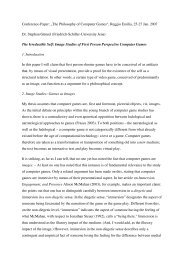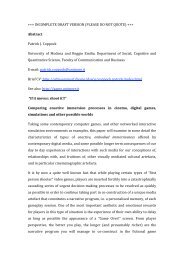Playing Dress-Up: Costumes, roleplay and imagination
Playing Dress-Up: Costumes, roleplay and imagination
Playing Dress-Up: Costumes, roleplay and imagination
Create successful ePaper yourself
Turn your PDF publications into a flip-book with our unique Google optimized e-Paper software.
<strong>Playing</strong> <strong>Dress</strong>-<strong>Up</strong> Ludica<br />
Perhaps the difference is that women prefer to express the sexual dimensions of their appearance on their<br />
own terms: how would I like to look, rather than, what would this male game designer like to look at? It<br />
is often painfully obvious when a male has designed a female avatar, as these tend towards highly<br />
exaggerated female characteristics. At the same time, online worlds offer women the opportunity to<br />
express their sexuality in a “safe” environment with both less judgment, <strong>and</strong> less direct physical risk. This<br />
supports Taylor’s finding that women may feel safe in a virtual world where they are on equal terms with<br />
men in terms of physical risk. (Taylor 2003A)<br />
Conclusion<br />
The aim of this paper has been to explore the implications of dress-up play as a means to create more<br />
gender-balance in both present <strong>and</strong> future game culture. By conjoining the act of dressing-up, which has<br />
high appeal <strong>and</strong> cultural resonance for women, with the instrumental <strong>and</strong> technical aspects of computer<br />
gaming, dress-up <strong>and</strong> <strong>roleplay</strong> seem to form a bridge which can cross many of the gender boundaries <strong>and</strong><br />
stratifications that seem to prevail in contemporary game culture. Additional attention to dress-up can also<br />
help the game studies community to move in a more gender-balanced position with respect to future<br />
research directions.<br />
Regardless of gender, dress-up play seems to feed a deep instinctive need for humans to find pathways for<br />
expression of diverse aspects of their personalities. In the past, this was accomplished through rituals <strong>and</strong><br />
societal obligations, with an occasional festival thrown in for release. In more modern times, especially<br />
in the Western world, many of these pathways are no longer viable. In fact, in the U.S., such role-playing<br />
is not viewed as consistent with our puritan ancestry, <strong>and</strong> this has led to a marginalization of such play in<br />
adult society. The rise of role-playing video games <strong>and</strong> open-ended metaverses that allow for individual<br />
expression <strong>and</strong> creativity are providing acceptable outlets for this innate human need. They offer a means<br />
for the expression of <strong>imagination</strong> that is not always possible in everyday life, <strong>and</strong> they do so without the<br />
scrutiny that today’s social mores tend to impose. This has gr<strong>and</strong> implications both in terms of play <strong>and</strong> in<br />
terms of gender roles. This phenomenon, which we have presented here, poses a complex range of<br />
questions that necessitate <strong>and</strong> deserve further study. We hope that this paper sparks a continuing dialogue<br />
on the important <strong>and</strong> transformative role of dress-up in both game studies <strong>and</strong> contemporary life.<br />
Philosophy of Computer Games 2007 Page 20






